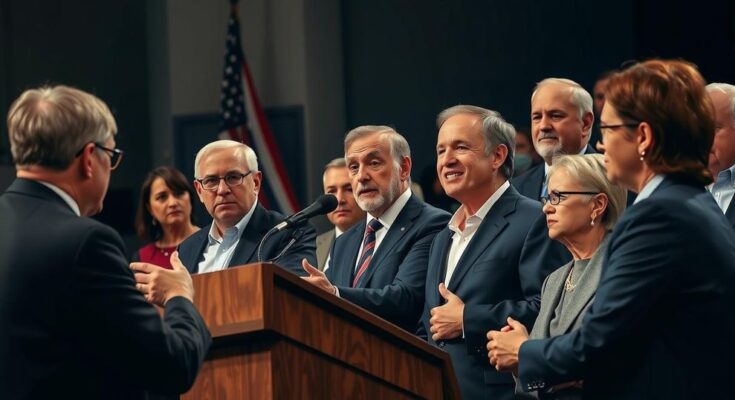Recent U.S. presidential campaigning demonstrates a notable shift towards stringent immigration policies, led by Trump and Harris. This trend reflects a global reality where both liberal and conservative parties are adopting far-right rhetoric, driven by fears surrounding immigration. Historical perspectives highlight how immigration fears have been politically exploited. Additionally, Democrats and Republicans are increasingly mirroring far-right ideological perspectives, leading to significant implications for asylum rights and immigrant integration.
The political discourse surrounding immigration is undergoing a notable transformation, with prominent U.S. presidential candidates adopting increasingly stringent measures. Former President Donald Trump, known for his incendiary rhetoric on immigration, has reasserted his commitment to massive deportations and strict border controls during his campaign. Trump has characterized immigration as an invasion, promising to deploy unprecedented measures to prevent undocumented individuals from entering the U.S. His vivid portrayals of undocumented immigrants as threats have echoed throughout his speeches, particularly in states such as Colorado and Wisconsin. Conversely, Vice President Kamala Harris, amidst her presidential campaign against Trump, has also embraced tougher immigration policies. Harris’s approach reflects a broader trend among both liberal and conservative parties to shift rightward on immigration issues. She has previously supported stringent border control measures, emphasizing additional staffing for border enforcement. Experts observe that this shift indicates the far-right’s growing influence on immigration policy, which has permeated the political landscape across the U.S. and Europe. Petra Molnar, a lawyer specializing in migration and human rights, articulated, “There’s this spectre of being overrun by ‘the other’ that has always been there… it seems to have filtered into the entire conversation around immigration.” Historically, immigration fears have been leveraged in political campaigns. This pattern was evident as far back as 1992 when Pat Buchanan declared the U.S. under an “illegal invasion.” Although those sentiments were met with considerable pushback from within the Republican Party at the time, comparable views are now significantly resonating with mainstream politics. This ideological shift is not confined to the U.S.; it mirrors developments in several European nations. Recent elections in the UK and Germany saw the rise of far-right parties advocating for stringent immigration policies. In July, the Reform UK Party managed to secure substantial electoral support by championing immigration restrictions, while the Alternative for Germany achieved historic electoral success, signaling a trend of increasing anti-immigrant sentiment. Even centrist parties, such as those led by President Emmanuel Macron in France, are responding to these dynamics by adopting measures that align more closely with far-right positions on immigration, indicating a tactical attempt to mitigate the influence of extremist parties. Moreover, the popularity of far-right populist parties is often exacerbated by economic factors, prompting politicians from major parties to adopt harsher immigration stances as a strategy to regain electoral favor. This electoral calculus places immigrants in the crosshairs as scapegoats for broader social and economic anxieties. In the U.S., immigration remains a pivotal electoral issue, ranking high among voter concerns. Polls indicate voters view immigration policy as increasingly salient, leading to bipartisan critiques of President Joe Biden’s administration, which has faced criticism for a record surge in border crossings. Ironically, Biden’s earlier commitments to humane immigration policies have given way to a continuity of many of Trump’s repressive measures. As Biden has pivoted to align with stricter immigration frameworks, Harris has announced plans to intensify enforcement, promising to implement even stricter measures than those her administration currently pursues. Despite some proposals for expanding legal immigration pathways, the overarching narrative remains one of defensive posturing in response to far-right framing of the immigration issue, stifling discussions on the merits of inclusive immigration policies and humanitarian responsibilities. This complex interplay of political strategy and ideological influence demonstrates a significant shift in the immigration debate, where both sides of the political spectrum increasingly mirror far-right stances, complicating the broader conversation about migrants’ rights and societal benefits from diverse communities.
The global political landscape is witnessing a pronounced shift towards far-right ideologies, particularly regarding immigration. Candidates across the political spectrum are increasingly adopting stringent measures in response to prevailing sentiments that depict immigrants as a threat. This shift is palpable in the U.S. political arena, notably among presidential candidates who are aligning their strategies with nativist rhetoric and policies, reflecting a concerning trend where views once deemed fringe are becoming mainstream. This phenomenon also mirrors broader patterns observed in European political dynamics, where traditional parties are co-opting far-right narratives to maintain their electoral viability amidst rising nationalist sentiments.
The current immigration discourse within the United States and other Western societies reflects a disturbing trend towards embracing rightwing ideologies. Candidates like Trump and Harris illustrate a significant ideological shift, where stringent immigration measures have become a focal point of political strategy. The rise of far-right populism is compelling mainstream parties to conform to these narratives, effectively sidelining the discourse on humanitarian obligations and the positive contributions of immigrants. This situation poses challenges for the broader conversation about immigration policies, as well as the established principles of asylum and refugee protections.
Original Source: www.aljazeera.com




